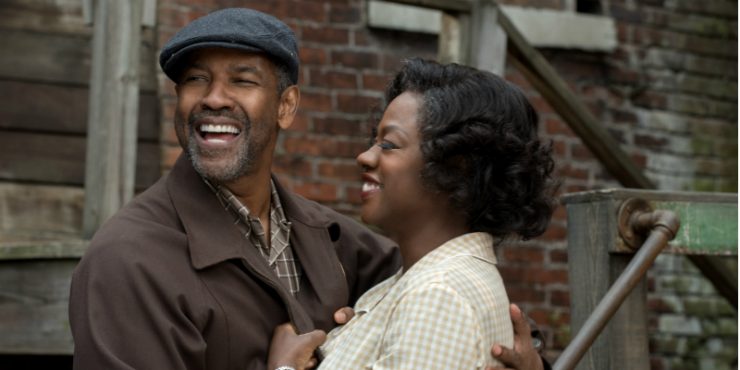There are few actors more fun than Denzel Washington when actively engaged. He’s one of our greatest movie stars, a true legend, an actor who’s skill and authority is rarely rivaled. It’s hard for Washington to be in a film and not be the biggest thing in it. Fences is his passion project. Based on August Wilson’s Pulitzer Prize-winning play (and filmed from a screenplay that the playwright wrote himself), Washington is directing as well as starring in this bombastic display of acting pyrotechnics. Washington plays Troy, a garbage collector and former baseball star who never made it in the major leagues (by the time the show began accepting blacks, he was 40), who lives in a small home with his wife Rose (Viola Davis) and teenaged son Cory (Jovan Adepo). Troy’s life is very hand-to-mouth. His job is back-breaking, hardly a good trade-off for a lost professional sports career. He has another, older son, Lyons (Russell Hornsby), from another woman, who plays guitar and asks for money weekly. Troy’s brother Gabe (Mykelti Williamson) is a disabled war veteran whose multiple handicaps leaves Troy with the hard choice of whether or not to put him in the hospital. Through all this, Cory is seeking a football scholarship that Troy will not allow, while Rose wants him to build a fence around their home.
Wilson’s play is a document of a man beaten down by life. A man too hard-headed to understand that bad behavior is a poor mix with bad luck. Troy is sunny and charismatic, but he’s capable of ruthlessness, and perpetuates an intimidation throughout his home. His complete refusal to permit Cory to play football (his own unfair experience with sports has colored his opinion on athletics) is cruel, his demand of loyalty and discipline is hypocritical. Wilson didn’t want to hide Troy’s imperfections, and Washington’s performance is equally transparent. At the core of Troy is a man who wishes to provide for his wife and son, but he doesn’t have all the necessary emotional tools, nor has society given him the proper advantage to develop them. Washington has such an affection for this man, and it shows in the performance. It’s tender and committed. Across from him, Viola Davis’ portrayal of obedience and strength plays as the perfect foil. But as a filmmaker Washington doesn’t seem to know how to make this story very cinematic, and doesn’t push the form far enough away from the stage. The film’s last hour descends into a darkness that stretches for too long. The strength of the performances get stretched thin, and by the end we’re left with theatrical metaphor. It’s still fun to see Washington be this good as an actor. Maybe he should’ve gotten a more exciting director.
Directed by Denzel Washington










